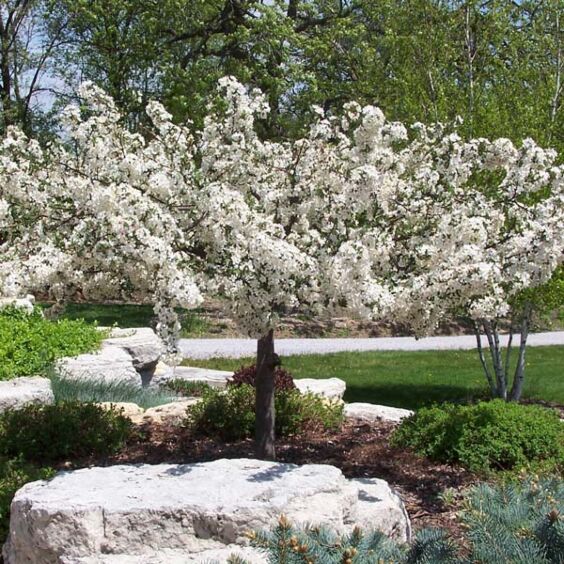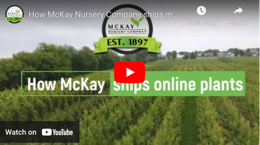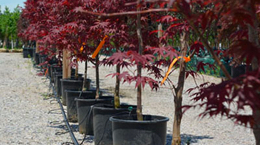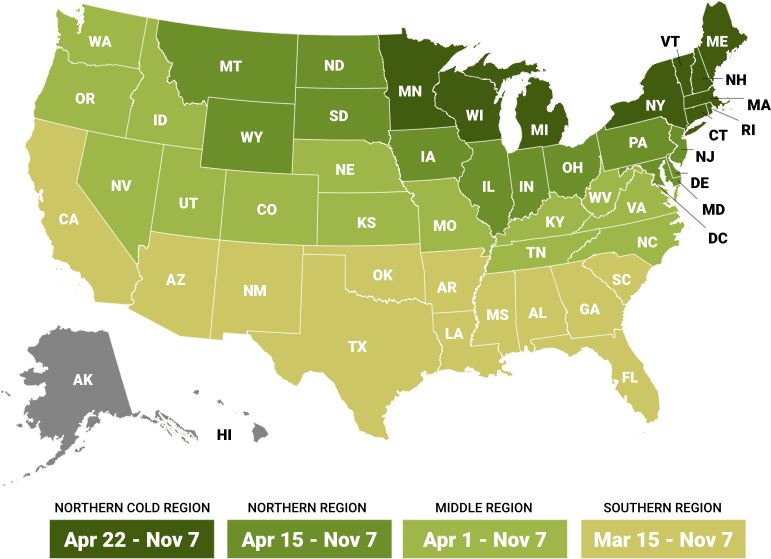
Growing zones
See Zone Map >Status: In stock
- Sun
Mature Plant Size (H x W): 8-12' x 6-8'
Bloom Season: Spring
- Attracts Birds
- Salt Tolerant
- Attracts Butterflies
- Attracts Pollinators
Planting & Care for Tina Crabapple Trees (Malus sargentii)
Preparation
- Best grown in medium moisture, well-drained, acidic loams in full sun.
- Adapts to a wide range of soils.
- Established trees have some drought tolerance.
- Plant as a specimen/accent or in small groups.
- Plant in spring or fall.
- Be sure to space plants 10 to 20 feet apart, depending on the expected mature size of the variety.
Opening Plant Material
- Grow Bags - Remove bag by using a utility knife to slit up the side and peel off the fabric exposing the soil and roots.
Planting Grow Bags
- Plant grow bags in spring or fall.
- Plant the root ball just like you would a container plant. No trimming of roots is necessary for grow bags.
- Notice where the base of the trunk flairs out from the tree. This is called the root flair. This root flair should show when the tree is planted. If necessary, add soil under the ball so the root flair is exposed.
- Place fertilizer packets into the bottom of the hole (if purchased). *Use Our Recommended Fertilizer.
- Backfill the hole with soil, making sure the top of the root ball is visible and slightly higher than the soil around it.
- Firm the soil around the plant. Water well to settle soil around the root ball.
Pruning - After Planting
- Grow Bags - Although it is not essential for grow bags to be pruned after planting, a light pruning for shape, to remove any broken branches from shipping, or to thin out a heavily branched plant will help in the transplanting process and in the appearance of your new planting.
Pruning - Through-out the Season
- Although some flowers may be lost, it is best to prune this tree as needed in late winter. Spring pruning should be avoided as it produces fresh, open cuts where fireblight bacterium can enter.
Watering - After Planting
- Plants typically take approximately 6 weeks to establish new roots in your soil. During this period, water plants as often as every 2-4 days at the start and at least a minimum of once per week.
- Beyond the 6 week establishment period, water once per week, unless rains occur.
- Stick your finger into the soil around 3” to check soil moisture.
Watering - Through-out the Season
- After the first season, plants should only be watered during extended periods without rain.
- How do you know if your plants need water? The easiest way to tell is to touch the soil around the roots. If it is moist, there is no need to water. If it is dry, give it a good soaking with the hose end (no nozzle) watering the soil only, not the leaves.
- Stick your finger into the soil around 3” to check soil moisture.
Planting & Handling Help
Download our Planting and Handling Guide below to plan for a successful arrival and install of your plants. Be sure to water all plants as soon as they arrive and every day until you’re ready to plant. Keep any bare root bundles in a shady, cool spot with the roots covered at all times.


Learn More
Watch our videos on handling bare root plants, how your order is prepared for shipment and more.


Plant Sizing
What is the difference between Containers, Grow Bags, Bare Root, and Balled & Burlap (B&B)?
Shipping Times


Our FedEx and local shipping times depend on two factors, one is by the region and the second is the type of product being shipped. For example, small fruits are only shipped in spring, but majority of our perennials are shipped from spring until fall. Keep in mind the dates below act as a general guide. Due to unpredictable weather, staffing, inventory and industry demands these timelines can change. Therefore, we cannot guarantee any of these times.
Shipping Dates by Region*
Northern Cold Region: April 22nd - November 7th
Northern Region: April 15th - November 7th
Middle Region: April 1st - November 7th
Southern Region: March 15th - November 7th
Local Delivery (small radius from Waterloo, WI): April 22nd - November 7th
Shipping Dates by Season*
Spring Shipping: Region Start Date (above) - May
Fall Shipping: September - November
Due to unpredictable weather, these times may vary. Some varieties are exceptions due to heat and plant health reasons. Enter your shipping zip code at the top of this page and be sure to check the shipping information on each product before you add it to your cart. If the product is too large or restricted in your state, you will not be able to checkout with that item in your cart.






